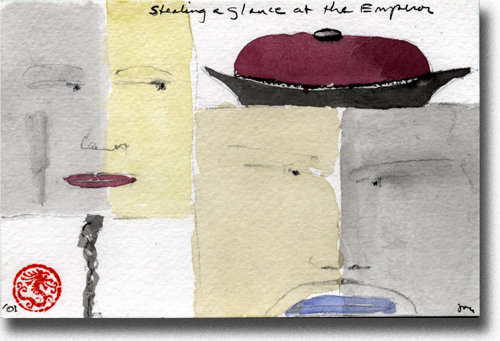
© 2001, James A. Clapp
It didn’t seems to matter much to George Bush, or to American’s in general, that the president’s insistence on giving China’s president Mr. Hu Jintao a “luncheon” rather than a state dinner was an insult to Mr. Hu and the Chinese people. Such details can matter greatly in interactions with Asians, and such gaffs as referring to China as the “Republic” of China rather than “the People’s Republic of China, and the incident of the heckler during Mr. Hu’s White House speech, have even been edited out of official news reports back in the PRC. When their leader loses “face,” the people lose face as well.
The Chinese take “face” to levels of meaning and expression that we Westerners can barely fathom. As an expression of personal honor, “face” can be a complex and frequently perilous trap for the Occidental tourist. Face ranges from the peasant’s last refuge of personal dignity, to the wealthy businessman’s demand for “respect” in the most hard-nosed negotiation. Causing a Chinese to “lose face” can lose the offender anything from your place in line to losing your life.
As with many other things, the Chinese have also made a quasi-science of the physical “face”. “Face reading” is employed as the visage equivalent of graphoanalysis to “read” one’s character, personality and emotional states. That Asians often seem more adept at concealing their own emotions behind cool facial expressions forms the basis, of course, for their fabled “inscrutability”.
And from a directly aesthetic perspective. the Chinese, as one might find among most racial and ethnic groups, tend to see the most appealing physical features through somewhat ethnically-narcissistic lenses. More than a few Occidentals have been dismayed to learn that Asians are not necessarily envious of our oversized, and often overstuffed, bodies, and, of course, our more prominent noses.
Westerners may have their own, if less obsessive, versions of “face,” but we are far less adept at keeping our emotions well-concealed behind them. Once can only wonder what they make of George Bush’s smirking chimp face. But Bush isn’t the first, and won’t be the last, Westerner, to stumble over the complex and pervasive concerns about face in the Orient.
It was only a few years after the events of 1989 that I, and a few members of the tour on which I was escorting professor, were boarding our coach on our first day. Our China International Travel Service guide introduced herself and then said: “Our driver for this part of the tour does not speak English, but you can say “nihao” to him, which means “hello”. His name is Mister Hu.” She said something to him in Mandarin, and Mr. Hu turned in his driver’s seat and gave a quick, shy wave.
Rhonda, a thirty-some social worker from Brooklyn, and her mother were sitting behind me. We were midway down the coach. I would learn throughout the tour that Rhonda’s quick and “Brooklynese” sense of humor did not always square well with Chinese concerns about “face.” She leaned forward a few inches from my ear.
“Who is he, did she say?” she asked sotto voce .
“Hu.” I whispered, half-turning my head.
“That’s what I asked you, WHO?” she whispered more forcefully.
“Hu’s the driver.” I repeated
“That’s what I want to know. . .”
“MR. HU is the DRIVER!” her mother interjected loudly enough that I could see Mr. Hu’s head lift slightly.
In a flash those within earshot of this exchange were covering their faces and stifling laughs, terrified at giving insult to our hosts within minutes of first meeting them. We managed to get ourselves under control, and being careful not to give offense for the next several days that Mr. Hu was our driver we took care that he was out of hearing range of what became an irresistible impulse to play with the linguistic confusion.
“Who’s going to be driving today?”
“Hu.”
“OK, so tell me, who’s driving!”
and,
“Does anybody know which direction we’re traveling in?”
“Hu knows.”
“Well somebody must know. . .!”
“Hu cares, anyway!”
and, to the Mickey Mouse Club song, “Hu’s the leader of us all, da-da, da-da, da-da . . .”
and,
“Just Hu the hell does he think he is, the driver?”
and, inevitably,
“Hu’s on First.” Etc.
Later, when Sung, our guide asked me what I thought of Mr. Hu’s driving I took it as her suspicion that we might not have been satisfied with him. But perhaps she had overheard our joking and laughing in spite of the care we took.
Sung’s English was quite good; but her sense of humor was Beijingese, not Brooklynese. So I thought I would come clean and try to explain that we Westerners meant no disrespect if she happened to hear something that doesn’t translate cross-culturally. She was going to be with us the whole way, so it seemed worthwhile to get this understood early; after all, I was the escorting professor and I didn’t want to lose “face” with her.
It took nearly an hour to explain the classic comedy routine “Who’s On First” to Sung because I had to explain baseball first, then who Abbott and Costello were. I think she grasped the main points, but she could only manage a polite, weak smile. Maybe I don’t do a decent Abbot and Costello. Maybe it was that I was seen by her as a “professor” and the Chinese don’t laugh at what professors have to say. OK, at least I tried.
Then, when we got to Shanghai, we got a new bus driver. Mr. Hao.
___________________________________
©2006, James A. Clapp (UrbisMedia Ltd. Pub. 5.5.2006)
